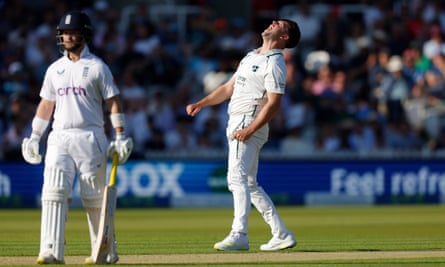Ireland Cricket Team faces Lord's challenge due to McCollum's insufficient experience in first-class cricket | The Guardian

High summer came just a couple of hours late to Lord’s. It arrived round about lunchtime, when the sun came out from behind the clouds that had blanketed the ground earlier in the day. It was huddle-up and clutch-your-cuppa weather in the morning, and a thankless time for batting. By lunch, though, the place was en fête. A cream-coated Dixieland jazz band was parping brass in the Harris Garden, and that side of the ground was alive with panama hats, cravats and candy-cane coloured blazers and caps. The Test season had started at last.
By then, Ireland’s batting was as good as broken. They had taken a beating in the first hour of the day, 15 for one, 19 for two, 19 for three, a hair’s breadth from 19 for four when Stuart Broad almost had Paul Stirling first ball. Ireland’s opener James McCollum just about pulled his team through it. He had 29 off 93 balls at the break, a tidy little innings in which he rode out a couple of torrid passages when he was beaten inside, outside, and every which way by Matthew Potts, who worked the ball both up and down the slope.
It is worth stopping on McCollum, since, soft hands, sure feet, steady defence, he has the makings of a Test match batting technique. He is 27 already, made his first-class debut six years ago, but has played only 22 games, the majority of them for the Northern Knights, who are based in Belfast, back in 2018 and 2019. In the four years since, he’s played exactly five first-class matches, one of them an Ireland A game in 2021, three more the Tests Ireland played in Bangladesh and Sri Lanka this year, and the other a warm-up against Essex last week. England’s Ben Duckett, by comparison, is only a year older, and has played 128.
In this, McCollum is pretty typical. The best young batter in his team, Harry Tector and Lorcan Tucker, have, like him, both played those same five first-class games since 2019.
“I don’t know much about red ball cricket,” Tucker said before this game. “I’ve hardly played any in four years.” Batting against Broad on a cloudy morning at Lord’s is tough enough, doing it when you’ve only played five games of first-class cricket in four years, and three of them were in Sri Lanka and Bangladesh, is an impossible job. They are being set up to fail.
It isn’t supposed to be like this. Cricket Ireland set up a first-class competition shortly before they won Test status, but they were forced to suspend it during the pandemic. They wanted to start it up again this season but they couldn’t afford to do it. They had a deficit of €176,184 last year, about £150,000, and €1,230,869 the year before.
It is a shoestring operation, run on goodwill and spit. They have a budget of about €12m a year, and rely in large part on distributions from the International Cricket Council. Plans to restart the first‑class competition in 2024 depend on how much they are awarded for the next four years. In the meantime, they have no choice but to prioritise one-day cricket, and hope they can qualify for the World Cup this autumn, which would be worth €1m to them. The Irish fought for years for the right to play Test cricket, it must feel like they have arrived just in time to watch it wind down.
Make no mistake, outside the four walls of Lord’s, the format is struggling. Ireland have hosted exactly one Test, the first they ever played, and it lost them €1m. They aren’t alone in that. Unless they’re playing against India, England, or Australia, most countries simply can’t afford to play it any more, and have scheduled only the bare minimum they can get away with.
The England and Wales Cricket Board’s new chief executive, Richard Gould, touched on all this in an interview in the match programme. “Test cricket has what some would regard as an antiquated commercial system whereby a touring team doesn’t receive any payment other than expenses,” Gould explained. “They’re relying on their own domestic markets to finance their Test team. These are things which we need to look at, in the same way the Indian Premier League pays boards for their players, we may need to do something to provide a market reaction.”
It will be interesting to see if the ECB does follow through on this. It would cost it, but it would be money well spent and benefit the game.
The ECB isn’t so very rich – as Gould said himself in another recent interview, its commercial revenue is dwarfed by those of a lot of Premier League football teams. But everything’s relative. The revenue generated for the local economy by this one Test would run Irish cricket for a year; given what they charge for ice creams here, the confectionary take alone would probably be enough to prop up one of the Irish provinces for a summer. Gould’s is a good plan, and suggests that, for the first time in a long while, the game here is being run by someone who understands what needs to be done.




